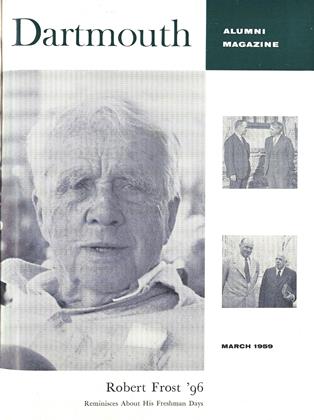ETHICS IN A WORLD OF POWER: THE POLITICAL IDEAS OF FRIEDRICH MEINECKE
MARCH 1959 ARTHUR M. WILSONBy Richard W. Sterling.Princeton: Princeton University Press, 1958.318 pp. $6.00.
Several purposes are served by this extremely able and lucid book. It is, in the first place, a skilful and faithful study of the ever-evolving and subtly changing political thought of Friedrich Meinecke (1862-1954), the most important German historian of the twentieth century. This analysis leads to a re-examination and re-evaluation of the historical and constitutional meaning of the existence of Germany as conceived by German thinkers like Goethe, Fichte, Hegel, Ranke, Bismarck, and Meinecke himself. As Professor Sterling remarks, "Meinecke provides a peculiarly sensitive guide into the German world of ideas."
Such a re-evaluation opens up, in turn, the whole vista of speculation regarding the relationship of power and ethics in the world of international politics. The problem of how to achieve wisdom in the conduct of foreign policy, writes Professor Sterling, is simply the problem of how to bring expediency and justice into a satisfactory relationship. He has no illusions about the difficulty of achieving such a relationship, however. His book is very twentieth-century in its awareness (as Meinecke also was aware) of the inescapable ambiguities and dilemmas and polarities that beset realistic thought and action.
This, therefore, is a very practical book; it throws light on the greatest of all great issues in the conduct of foreign policy. And it is practical, too, for giving its readers insights into modern German history and German modes of political thought more skilfully and more clearly than any other book that I know. Professor Sterling's command of his material is comprehensive and rigorous, his prolonged encounter with German syntax has not impaired the limpidity of his own, and the quotations he uses have been idiomatically and most expertly translated. The volume springs from the heart of the author's professional interests and personal experience, for his principal teaching and research interest is political theory as applied to international relations and he was himself a student in one of Meinecke's seminars. His book will be taken very seriously not only by political scientists and students of international relations but also by philosophers and historians.
 View Full Issue
View Full Issue
More From This Issue
-
 Feature
FeatureFRESHMAN DAYS...
March 1959 By EDWARD CONNERY LATHEM '51 -
 Feature
Feature"Spoiled Children" of Hanover: A Letter from Charles Doe, 1849
March 1959 By JOHN P. REID -
 Feature
FeatureSCHOOLMARMS, GRAMMARIANS and ANARCHISTS
March 1959 By ROBERT S. BURGER -
 Class Notes
Class Notes1918
March 1959 By THOMAS E. SHIRLEY, W. CURTIS GLOVER, RICHARD P. WHITE -
 Class Notes
Class Notes1950
March 1959 By SCOTT C. OLIN, SIMON J. MORAND III -
 Class Notes
Class Notes1926
March 1959 By ROBERT L. MAY, EDWARD J. HANLON, BRUCE W. EAKEN
ARTHUR M. WILSON
-
 Article
ArticleDemocratic Thought
December 1941 By ARTHUR M. WILSON -
 Books
BooksOUR ARTISTIC WORLD
December 1942 By Arthur M. Wilson -
 Books
BooksL'AMOUR EN BOUTON,
January 1951 By ARTHUR M. WILSON -
 Books
BooksHUMAN NATURE AND POLITICAL SYSTEMS.
November 1961 By ARTHUR M. WILSON -
 Books
BooksTHOUGHTS FROM ADAM SMITH.
JUNE 1963 By ARTHUR M. WILSON -
 Books
BooksMIDDLING NESS:
APRIL 1966 By ARTHUR M. WILSON
Books
-
 Books
BooksPrinciples of Preaching
November, 1924 -
 Books
BooksPEN-DRIFT: AMENITIES OF COLUMN CONDUCTING
APRIL 1932 By F. L. Childs -
 Books
BooksTHE POETRY OF GREEK TRAGEDY.
July 1958 By JOHN B. STEARNS '16 -
 Books
BooksFurther Mention
MAY 1972 By JOHN HURD '21 -
 Books
BooksThe Drifting Home,
FEBRUARY, 1927 By Ralph P. Holben -
 Books
BooksRENAISSANCE CONCEPTS OF METHOD.
June 1961 By WILLIS F. DONEY


